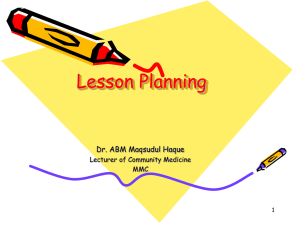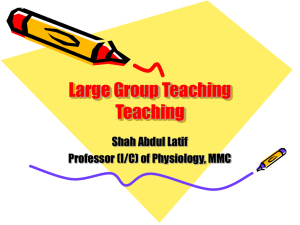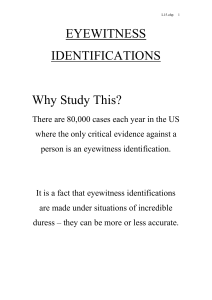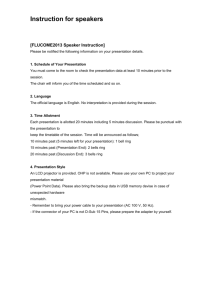OHP - VBN
advertisement
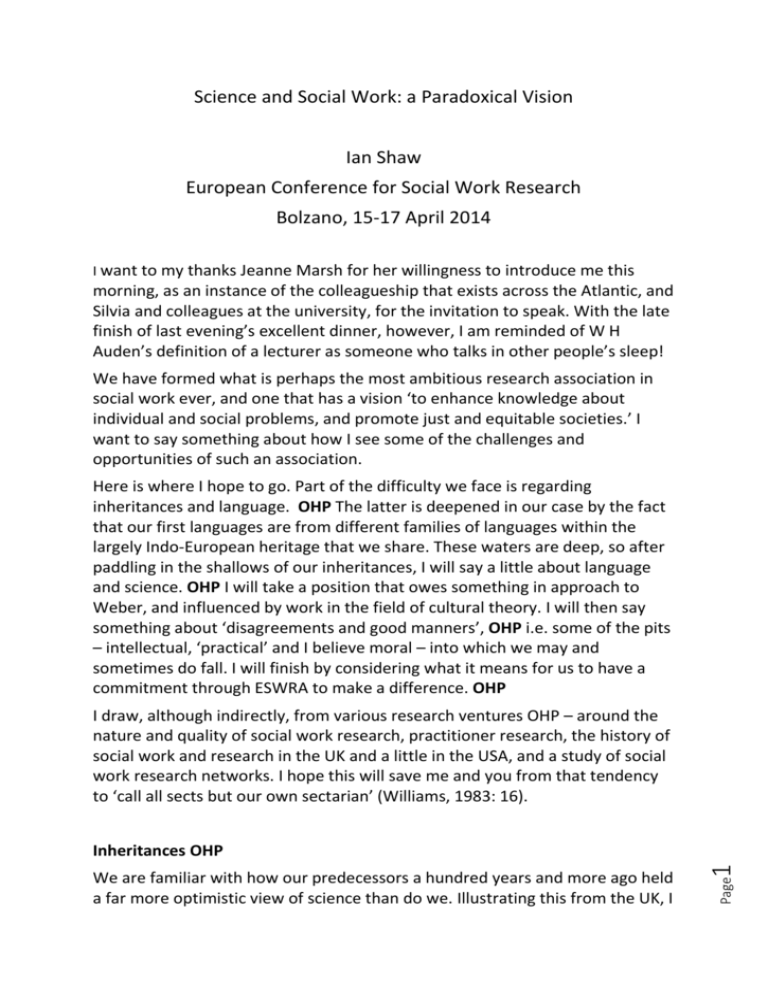
Science and Social Work: a Paradoxical Vision Ian Shaw European Conference for Social Work Research Bolzano, 15-17 April 2014 I want to my thanks Jeanne Marsh for her willingness to introduce me this morning, as an instance of the colleagueship that exists across the Atlantic, and Silvia and colleagues at the university, for the invitation to speak. With the late finish of last evening’s excellent dinner, however, I am reminded of W H Auden’s definition of a lecturer as someone who talks in other people’s sleep! We have formed what is perhaps the most ambitious research association in social work ever, and one that has a vision ‘to enhance knowledge about individual and social problems, and promote just and equitable societies.’ I want to say something about how I see some of the challenges and opportunities of such an association. Here is where I hope to go. Part of the difficulty we face is regarding inheritances and language. OHP The latter is deepened in our case by the fact that our first languages are from different families of languages within the largely Indo-European heritage that we share. These waters are deep, so after paddling in the shallows of our inheritances, I will say a little about language and science. OHP I will take a position that owes something in approach to Weber, and influenced by work in the field of cultural theory. I will then say something about ‘disagreements and good manners’, OHP i.e. some of the pits – intellectual, ‘practical’ and I believe moral – into which we may and sometimes do fall. I will finish by considering what it means for us to have a commitment through ESWRA to make a difference. OHP I draw, although indirectly, from various research ventures OHP – around the nature and quality of social work research, practitioner research, the history of social work and research in the UK and a little in the USA, and a study of social work research networks. I hope this will save me and you from that tendency to ‘call all sects but our own sectarian’ (Williams, 1983: 16). Page We are familiar with how our predecessors a hundred years and more ago held a far more optimistic view of science than do we. Illustrating this from the UK, I 1 Inheritances OHP want to suggest that the picture was not as monolithic as we often believe. In the UK that position has often been detected in the work of the Charity Organisation Society and Charles Loch. OHP He argued that charity ‘is not spasmodic, casual and emotional, but, like science, an all-observing, allcomprising intelligence. It is not antagonistic to science: it is science - the science of life – in operation – knowledge doing its perfect work’ (Timms, 1968: 59). But it was equally evident in those who backed the Settlement movement. Take Clement Atlee OHP – later to be one of the most significant if least appreciated of British Prime Ministers (Atlee, 1920). ‘Science has been rescued through the work of the practical social worker, the experimenter, and the investigator’ (p. 17), such that science in this field has become ‘the hopeful science’ (p.18), and social work ‘the legacy of the prophets.’ The connection between the scientific motive and social reform was seen as more than a means to an end. ‘There are numbers of social workers who find in the work of research and investigation the best outlet for their desire for social service… the scientific motive takes its place as one of the incentives that lead men to devote themselves to social service.’ (p. 16, 17). Page Beatrice Webb, co-founder of the London School of Economics, OHP as seen in her journal entries and later recollections, came quite early to reject what she viewed as the religion of science. She expressed how she had an increased ‘distaste for … all attempts to apply the scientific method to the Purpose as distinguished from the Processes of existence’ (1893). Talking of Herbert Spencer she concluded that ‘His failure to attain to the higher levels of conduct and feeling has sealed my conviction in the bankruptcy of science when it attempts to realize the cause or the aim of human existence’ (Webb, 1971: 62). Indeed, already by 1887 she was writing in her diary that ‘The religion of science has its dark side. It is bleak and dreary in sorrow and in ill-health. And to those whose lives are continual suffering it has but one word to say – suicide’ (p. 115). The religion of science entailed ‘an implicit faith that by the methods of physical science, and by these methods alone, could be solved all the problems arising out of the relation of man to man and of man towards the universe’ (p.102). 2 The English position on social progress can been seen as the outcome of tension between older English positivistic attitudes to science and German romanticism (Burrow 1970). OHP Much of our shared intellectual history and to a significant degree welfare interventions has been a battle between those who wish to give emotion, spontaneity, intuition, and the life of the imagination their due recognition against an all-eroding positivism. She identifies ‘two outstanding tenets, some would say, idols of the mind’: ‘There was the current belief in the scientific method, in that intellectual synthesis of observation and experiment, hypothesis and verification, by means of which alone all mundane problems were to be solved. And added to this belief in science was the consciousness of a new motive; the transference of the emotion of self-sacrificing service from God to man.’ (p. 146)1 Social work science and language OHP We already have run across words that form an unavoidable part of our vocabulary OHP – disciplines, experiment, positivism, practical, science and scientific method, theories – as well as references to how these interact with faith-based positions. There are others – subjective and objective, ideology, pragmatism, ideology, empirical, art and ‘social work’ itself. We use words to bind together certain ways of seeing society and social work. But we may also use words to open up issues and problems of which we need to be much more conscious. This does not mean that the problems will thereby be solved. Understanding the complexities of the word ‘class’, for example, does little to resolve class disputes and conflicts; just as understanding evidence based practice or postmodernism does little to improve social work. But these disputes cannot be thought through – or even brought into focus – unless we are conscious of words as elements in the problems. Such an exercise can contribute, if not resolution, then, in Raymond Williams’ words, ‘just that extra edge of consciousness.’ OHP It is common to speak of the ‘proper’ or ‘strict’ meaning of a word, but many of you will be more likely to reply that a word means only what it is now taken to mean, or that meanings are defined by contexts of use. Of course context is hugely important but ‘the problem of meaning can never be wholly dissolved into context’ (Williams, 1983: 22). Positivism 1 She never came to accept either for herself. ‘All that happened was my detachment from Christianity’ (p.107). For her and for many it was the Great War that undermined these confidences ‘now that we have learned, by bitter experience of the Great War, to what vile uses the methods and results of science may be put’ (p.146). Page I have long rejected fundamental aspects of both Comtean and Logical Positivism, while at the same time having little patience with the vigilantes 3 Can we pause on just two of these – positivism and experience. who claim to see positivists everywhere, and fail to see the trees for the wood (e.g. Shaw, 1996, 1999). Phillips may slightly exaggerate when he says: OHP The general fantasy is that anyone who is impressed by the sciences as the pinnacle of achievement of human knowledge, anyone who uses statistics or numerical data, anyone who believes that hypotheses need to be substantially warranted, anyone who is a realist … is thereby a positivist. Comte saw each branch of knowledge as passing through three states: ‘the theological or fictitious state, the metaphysical or abstract state, and the scientific or positive state’. OHP This reflected the nineteenth century assumption of scientific and intellectual progress and the superiority of scientific knowledge over other knowledge forms. He gave up the search for absolute truth. If knowledge results from sensations, then sensations are the only certain elements of knowledge, and we can have no good reason to believe that anything but sensation exists. So for him it was not only a theory of knowledge but also a scheme of history and a programme of social reform a free-thinking radical movement as well as a scientific one. The main general sense is of anti-dogmatism and resistance to theory OHP – a position that is engaged with by Bruce Thyer (though he is not in general a Comtean positivist). As for example, when he recommends ‘Let us relegate theory to its proper role. It is neither essential nor necessarily desirable for research on social work practice to be theoretically driven’ (Thyer, 2001: 22). This leads to empirically based scepticism that is far-reaching. Comte’s legacy is a complex one, and ‘a non-trivial matter for contemporary social scientists’ (Phillips). Logical positivism emerged from the Vienna Circle of the 1920s and 30s, and was famous for the verifiability principle or criterion of meaning – to rule out, by defining them as meaningless, any statements that could not be verified by means of sense experience. Logical positivists in effect hold a form of foundationalism – knowledge is built on a secure foundation of theory-free, neutral, sense experience. The vigilantes are right to be critical of the positivists’ analysis of science but they are wrong ‘to act as if all admiration of science is beyond the pale.’ Page Service users are not suggesting that experiential knowledge is the only knowledge that should be valued or that it should be prioritised. What 4 On experience I want to make just one point - about the relationship between experience and knowledge as it relates to the call for the voice of services users to be heard. I quote Peter Beresford: they have repeatedly expressed concerns about is the way that it has long been systematically excluded from social policy discussions and developments and from social research. In this they do not deviate from views like those expressed by Norbert Elias, that a balance is required and the full spectrum of research approaches should be considered for inclusion (Beresford) In general I bring a view about science that in some ways is like that of Weberi. OHP Science, he insisted in the gendered language almost universal at the time he was speaking (1919), demands a ‘strange intoxication’. ‘Without this passion … you have no calling for science and you should do something else. For nothing is worthy of a man unless he can pursue it with passionate devotion’ (Weber 1948, 135). As Medawar later expressed it, ‘to be good at science one must want to be – and must feel a first stirring of that sense of disquiet at lack of comprehension that is one of a scientist’s few distinguishing marks.’ That entails ‘power of application and (a) kind of fortitude’ (Medawar 1984, 9, 10). But while enthusiasm is a prerequisite, no amount of enthusiasm, remarked Weber, ‘can compel a problem to yield scientific results.’ ‘Calculation’ OHP is also indispensable. He advises that ‘No sociologist… should think himself too good, even in his old age, to make tens of thousands of quite trivial computations.’ But further, some ‘idea’ has to occur if one is to accomplish anything worthwhile. ‘Normally such an “idea” is prepared only in the soil of very hard work’ but not always the case. ‘Ideas occur to us when they please, not when it pleases us’. For example ‘when taking a walk on a slowly ascending street’ (Weber, 1948: 136). ‘Yet ideas would certainly not come to mind had we not brooded at our desks and searched for answers with passionate devotion’. This reminds me of a remark attributed to Isaac Newton and the story of how, when asked how he had arrived at the theory of gravity, he said – not by seeing an apple fall but – “By thinking about it all the time.”ii Disagreements and Good Manners in Social Work Science OHP I will say where I stand on three issues – lazy thinking, romanticism, and talking at people with whom we disagree. Page To begin with, I am weary of dismissive remarks about the distinctive superiority of social work to e.g. the natural sciences. Like language, the argument is badly in need of disentangling. I want to listen with you to some scientists speaking about their work. Please read and reread these extracts. OHP EXAMPLES - HANDOUT 5 Lazy thinking From them I conclude OHP there is scarcely a single point at which social work allegations about the special nature of social work science and practice, and the demerits of natural science approaches hold true as generalizations. I would also conclude that there is not one naturalistic ideal in the natural sciences and, reasoning from the greater to the less, and in the words of Derek Phillips, ‘there is not one naturalistic ideal for the social sciences; rather, there are several’ (Phillips, 2000: 86). The problems come from two directions. First, qualitative researchers are too prone to make unfavorable comparisons with natural science and often drag in the ‘positivist’ allegation. From others one gets the image of the natural sciences as offering to social work a benchmark of experimental, neutral rigour. Both are wrong. There are, of course, several questions tangled up in this: OHP 1. Are the concepts and theories of social work of a similar or different order to those of the natural sciences? 2. Are the methods of social work research of a similar or different order to those of the natural sciences? 3. In what ways are the practices of scientific communities in social work, the social sciences and the natural sciences comparable? 4. Should social work engage with the natural sciences – and with natural scientists? Page 1. The use of certain concepts and findings from the natural sciences. This process ‘often requires great ingenuity and intellectual persistence’ 92. However, ‘the use of such borrowed ideas only makes intellectual sense if the borrower is already committed to the view that there is no relevant difference between the natural and social or human sciences’ 93. An obvious example here is the way ideas of evolution have been applied to society – Spencer was the best known such case, though Charlotte Towle argued for seeing the child guidance clinic as more than 6 On the first two questions Derek Phillips has an essay on naturalistic ideals in social science that is worth reading, OHP without following him at every point. I want to recap his argument. By ‘naturalistic’ Phillips means ‘a social science that is in important respects structurally or methodologically similar to the natural sciences’ (Phillips, 2000: xii) and someone ‘who holds that, in some fashion that he or she is obliged to make precise, the social sciences are similar to the natural sciences’ (p. 86). ‘In some fashion’ and ‘obliged to make precise’ are important caveats. He suggests four strategies OHP for arguing that the social sciences parallel the natural sciences. an agency but a laboratory and as having a place in social evolution. The current social work interest in neurosciences is of this kind. 2. The use of ‘deeper’ presuppositions from the natural sciences. E.g. that causation works the same in both spheres. The problems here are very complex. The work on critical realism is one field where the issues are being worked on. 3. The adoption of “structural” features of natural science. E.g. theories. The early Chicago ecological models of the city were of this order, as is more recent work on systems and ecology, and complexity theory (social work scholars one the one hand may criticise the natural sciences while at the same time being deeply influenced by them). 4. That the method of the natural sciences can be used fruitfully in the social sciences. If we want to argue that social work science works in different ways we need to do more than simply refute one kind of argument for naturalism. Romanticism In complaining about romanticism we are again back in difficult territory. We are dealing with the contrast between the state of nature and what man had made – e.g. nature and society. In history these opposing responses were represented in the Enlightenment movement (society as good) and the Romantic movement (society as bad). Nature is what man has not made. Just think how you instinctively take sides when I say Gemainschaft and Gesellschaft. Yet we all must heed Becker’s plea for the avoidance of sentimentality, which we are guilty of Page But there are varieties of hidden and naive Enlightenment thinking OHP that are around, and in some unexpected places. I referred earlier to the periodization framework in Comte. To offer two strikingly different instances, I suggest that Denzin’s successive arguments about ‘moments’ in the history of qualitative research have hints of a view of positive knowledge progression. And just a few weeks ago a history of evidence-based practice unashamedly advanced the case that 7 ‘when we refuse, for whatever reason, to investigate some matter that should properly be regarded as problematic. We are sentimental, especially, when our reason is that we would prefer not to know what is going on, if to know would be to violate some sympathy whose existence we may not even be aware of.’ (Becker, 1970: 132–3) The first shift in social work, from a morally based to an authority-based practice paradigm, was finalized by the early 1930s. The second shift, which is an attempt to transition from an authority-based to an empirically based practice paradigm, was initiated in the late 1960s and 1970s but has not been completed. (Okpych and Yu, 2014: 5) Morally, authority, empirically – these are closer to Comte’s theological, metaphysical and positive than may appear. And note ‘but has not been completed.’ We frequently encounter this ‘not quite’ caveat of something till just beyond reach. Talking with not at OHP My final lament is the ways in which positions with which we may disagree are discussed. How many discussions of what is believed by advocates of postmodernism, evidence-based practice and so on, are presented solely through the arguments of those who do not hold those positions. Sometimes they are also advanced in almost personalized ways. I have taken part in an exchange with Stanley Witkin in the last few months where I have endeavoured to act in ways consistent with how I think such disagreements should be handled (Shaw, 2014a, Staller, 2014, Witkin, 2013, 2014). I will try to express the intellectual aspect behind this position in terms of the vexed question of the relationship of philosophy in general and epistemology in particular to research. I am comfortable with neither the strict notion of incommensurability and paradigm differences, nor with the view that methods of research are purely rational or empirical matters. I have been in conversation a day or two ago with Paul Wong in the University of Hong Kong OHP – a quantitative colleague who is writing qualitative material. Here are his reflections, which seem to me to raise significant questions: 1. Incorporate both quality-as-measured and quality-as-experienced. Page Take for example, the issue of whether research counts as good research. As prescription for ESWRA OHP as a community we should commit ourselves to a view of good social work research that will: 8 I think writing qualitative research papers is much more difficult than writing papers from quantitative research. Writing quantitative papers from observational and experimental studies with good reporting quality can somehow follow a formula or template (e.g., CONSORT and STROBE), and the structure and planning of the article take care of itself … But writing qualitative papers is a rather creative process. Writing a convincing, objective, scientific story with limited numerical data is a calculative improvisation, much like Jackson Pollock's paintingsiii 2. Treat inner’ and ‘outer’ science criteria of quality as both indispensable, and brought to bear on any given research project or output. ‘Outer-science’ norms (eg being useful or emancipatory) are neither more nor less important than ‘inner science’ epistemic norms. 3. Seek agreement on quality dimensions at a middle range of generality, with the purpose of maximising agreement between diverse epistemological positions but not requiring a unitary consensus on quality criteria. 4. Hence regard research quality as multi-dimensional, including dimensions both intrinsic and extrinsic to the research act. 5. Require a relatively demanding minimum demonstration of quality on all dimensions. 6. Recognize research quality as reflecting both process (e.g. as in action research) and goal (as in RCTs). I do not have time to try this out (cf Shaw and Norton, 2007), though I do think it has enough mileage to incorporate a large proportion – though perhaps not all – positions represented in this lecture theatre (see for example, Reid, 2001). Finally, making a difference OHP Page I find myself wanting to say ‘No – and yet…’ OHP I feel uncomfortable with the language of ‘impact.’ It is, though we rarely acknowledge it, a metaphor, taken primarily from the field of dynamics, to refer to the striking of one body in momentum against another. Being ‘hit’ by research is perhaps too common an experience. I am also disquieted by the rush to measure – to reduce, to simplify. This leads, as the sociologist Ben Baumberg observes, to ‘untruthful truth’ such that no-one believes the impact scores but we all use them. I am one of several social work journal editors who have put our names to a critique of journal impact factors (Blyth et al, 2010). Yet how seductive they are. One of 9 The language of ‘impact’ has recently come to the fore. This is probably due in large part to challenges that stem from political and policy communities expressing unhappiness with relationships to the academy, and the relevance of traditional academic paradigms of scholarly communication and dissemination. In the UK it was mainly the previous Labour government that front-lined the cry for evidence-based policies, and this led fairly directly to calls for impact. E.g. in the UK the five yearly ‘Research Assessment Exercise’, this year renamed the Research Excellence Framework, now has an explicit rating of research on its demonstrable ‘impact’. More generally we are all aware of the rise and rise of the journal ‘impact factor’, driven – I am speaking purely personally here – by a less than holy joining of interests of publishers, editors, pressurising employers in the academy and ambitious scholars. the numerous editors who authored that article (there were many so I probably do not risk disclosure) has also said: ‘In the UK at the moment officially the impact of the journal doesn’t necessary matter, but I find that a bit hard to believe really… (so), much as we are sceptical about impact factor and league tables, (we wrote a paper about it), at the end of the day they are the rules of the game and if people want to prosper in the game they have to play by the rules, whether they think they’re crazy or not’ This sense of seductive madness is worth consideration. It promotes what Baumberg calls unhelpful reflection – reflection that is not helpful for application. ‘…and yet.’ OHP We want to make – and even to demonstrate - a difference. Most of us have just signed up to the following: ‘Article 1 Name and Vision 1. The European Social Work Research Association takes forward the development, practice and utilization of social work research, to enhance knowledge about individual and social problems, and promote just and equitable societies.’ Whose first listed goal is: 1. BENEFITS. Promote social work research which will have beneficial consequences for practitioners, service users, educators, researchers, graduate students, and those responsible for service development and delivery.’ I welcome the Research Councils UK (RCUK) definition of research impact OHP as ‘the demonstrable contribution that excellent research makes to society and the economy’. Research impact embraces all the diverse ways that researchrelated skills benefit individuals, organisations and nations.2 2 http://www.esrc.ac.uk/funding-and-guidance/impact-toolkit/what-how-and-why/what-is-research-impact.aspx Page I want to pick up two words in their definition. First, a key consequence of this approach to defining research impact is that it must be demonstrable. Second, and more interestingly, RCUK insists that ‘Above all, research must be of the 10 RCUK also wisely observe that ‘Determining the impact of social science research is not a straightforward task. Policy and service development is not a linear process, and decisions are rarely taken on the basis of research evidence alone. This makes it difficult to pin down the role that an individual piece of research has played’ (p. 168). highest quality: you can't have impact without excellence.’ It is no accident that the second named goal of ESWRA is ‘Foster and maintain the development of high levels of social work research and knowledge production across the European community of nations.’ OHP RCUK goes on to say that ‘the impact of social science research can be distinguished as: Instrumental: influencing the development of policy, practice or service provision, shaping legislation, altering behaviour Conceptual: contributing to the understanding of policy issues, reframing debates Capacity building: through technical and personal skill development.’ There is a significant underlying distinction between what we might think of as academic impact and wider social or economic impact – a distinction that mirrors what I said a few minutes ago about inner and outer science criteria of good social work research. Journal impact factors, for example, are proxy measures only about academic impact – and that in ways that undermine research quality and innovation. The UK’s Research Excellence Framework does the converse, defining impact solely in terms of what happens outside the university. The ESRC has moved from using a linear conceptualisation of ‘knowledge transfer’ to using ‘knowledge exchange (KE)’, a term that emphasises more interaction and conversation.3 What implications might this all have for us? OHP By ‘us’ I mean ESWRA. The options we – all of us – might push for include opening dialogues between researchers and research users so that they can share ideas, research evidence, experiences and skills. This may involve: 1. Using the Special Interest Group mechanism for seminars and workshops, placements and collaborative research. 2. Supporting the development of people in all our countries who can take on public roles. Where that public role will be positioned will vary from one country to another according to where social work policies are located. 3. Mutual training on how to respond to ideologues – though of course 4. Developing standards e.g. around what counts as unethical politicization of Page research 11 agreement on what we mean by ‘ideology’ will be difficult 3 http://www.esrc.ac.uk/funding-and-guidance/impact-toolkit/what-how-and-why/knowledgeexchange/index.aspx Page 12 OHP A paradoxical vision – one that demands of us a sense of inheritances that we may wish to embrace or distance ourselves from; that calls out for us to gain that extra edge of consciousness; that entails a set of commitments that most often depart from conventions and stereotypes both of social work and of those disciplines and fields that adjoin us; that challenges us regarding intellectual lethargy, romanticism and principled relations; and that sets an agenda to make a difference while avoiding seductive madness. References Abbott, E. A., (1931) Social Welfare and Professional Education. Chicago: University of Chicago Press Atlee, C. R. (1920). The Social Worker. The Social Service Library. London: G Bell and Sons Ltd. http://archive.org/details/socialworker00attliala Babbage, C. (1830) Reflections on the Decline of Science in England and on Some of its Causes, London: B. Fellowes, Ludgate Street. Bannister, J. and Hardill, I. (2013) ‘Knowledge mobilisation and the social sciences: dancing with new partners in an age of austerity.’ Contemporary Social Science: Journal of the Academy of Social Sciences, 8:3, 167-175 Becker, H. (1970) Sociological Work. New Brunswick, N.J.: Transaction Books Blyth, Eric, Shardlow, Steven M., Masson, Helen, Lyons, Karen, Shaw, Ian and White, Sue (2010) ‘Measuring the Quality of Peer-Reviewed Publications in Social Work: Impact Factors—Liberation or Liability?’ Social Work Education, 29 (2): 120-136. Burrow, J. W. (1970). Evolution and Society. Cambridge: Cambridge University Press. Denzin, N. K. and Lincoln, Y. S. (2005) ‘The Discipline and Practice of Qualitative Research’ in N K Denzin and Y S Lincoln (eds) Handbook of Qualitative Research Thousand Oaks: Sage Publications Diner, S. J., 1997, ‘Department and discipline: the development of sociology at the University of Chicago, 1892-1920’ in Plummer, K, (ed) The Chicago School: Critical Assessments London: Routledge. Dingwall, R. (1997) ‘Conclusion: The moral discourse of interactionism’, in G. Miller and R. Dingwall (eds), Context and Method in Qualitative Research. London: SAGE Publications. Djerassi, C. 1989. Cantor’s Dilemma New York: Penguin Books Hooykaas, R. 1972. Religion and the Rise of Modern Science. Edinburgh: Scottish Academic Press. Lengermann, P. and Niebrugge, G (2007). ‘Thrice told: narratives of sociology’s relation to social work’ in C. Calhoun (ed.) Sociology in America: a History. Chicago: University of Chicago Press. Pp 63-114. Medawar, Peter 1984. The Limits of Science Oxford: OUP Okpych, N. J and Yu, J L-H (2014) ‘A Historical Analysis of Evidence-Based Practice in Social Work: The Unfinished Journey toward an Empirically Grounded Profession.’ Social Service Review, 88 (1): 3-58 Phillips, D. C. 2000. The Expanded Social Scientist’s Bestiary. Lanham, Maryland: Rowan and Littlefield. Page Shaw, I. (1996) Evaluating in Practice Aldershot: Ashgate 13 Reid, W. J. 2001. ‘The role of science in social work: the perennial debate.’ Journal of Social Work 1 (3): 273-293. Shaw, I. (1999) ‘Seeing the Trees for the Wood: the Politics of Practice Evaluation’ (1999) in B. Broad (ed) The Politics of Research and Evaluation in Social Work, Birmingham, Venture Press Shaw, I. (2012) ‘Ways of Knowing in Social Work’ in Gray, M and Webb, S (ed) Social Work Theory and Methods, London: Sage 2nd Edition. Shaw, I. (2014a) ‘Before I built a wall: one sort of dialogue Qualitative Social Work 13 (2): 181-83. Shaw, I. (2014b) ‘Sociology and social work: in praise of limestone?’ in J Holmwood and J Scott (eds.) The Palgrave Handbook of Sociology in Britain London: Palgrave. Pp. 123-154. Shaw, I. (forthcoming) ‘The Archaeology of Research Practices: a Social Work Case’ Qualitative Inquiry Shaw, I. and Norton, M (2007) Kinds and Quality of Social Work Research in Higher Education London: Social Care Institute for Excellence. http://www.scie.org.uk/publications/reports/report17.asp Staller, K (2014) ‘Difficult conversations: talking with rather than at’ Qualitative Social Work 13 (2): 167-75 Thyer, B. (2001) ‘Theory testing in social work research.’ Journal of Social Work Education 37 (1): 9-25. Timms, N. (1968) The Language of Social Casework. London: Routledge and Kegan Paul. Webb, B. (1929) My Apprenticeship London: Longmans, Green and Co Webb, B. (1971) My Apprenticeship Harmondsworth: Penguin Books. Weber, Max. 1948 [1919]. ‘Science as a Vocation.’ In From Max Weber: Essays in Sociology, edited by H. H. Gerth, and C. W. Mills, 129-156. London: Routledge and Kegan Paul. Williams, R. 1983. Keywords: a Vocabulary of Culture and Society. London: Fontana Press. Witkin, S. (2013) ‘Qualitative Social Work: back to the future.’ Qualitative Social Work 12 (6): 722-31. Witkin, S. (2014) ‘Compromise and consequences: on the challenges of dialogue’ Qualitative Social Work 13 (2): 184-86. Page 14 Wolpert, L. and Richards, A. 1997. Passionate Minds: the Inner World of Scientists. Oxford: Oxford University Press. Making and doing science Science and passion Art and science ‘Natural scientists are reductionist and social work looks at the whole’ Writing science – genre, passion again, and impacts on making connections 15 Roald Hoffman – theoretical chemist Character introducing joint Nobel Prize winners: ‘Today we have the privilege of listening to two “uncommon men”… I use these words in the sense defined by Gerald Holton, the Harvard physicist and philosopher of science: men who make science, as distinguished from most members of the scientific community, who do science; who do most of the “mopping up”, a phrase coined by…Thomas Kuhn.’ Speaking of theoretical chemistry, ‘I love it. I like the subject, its position in between, its compromise between simplicity and complexity... (B)eauty is in the reality of what’s out there, residing at the tense edge where simplicity and complexity contend’. ‘I think poetry and a lot of science – theory building, the synthesis of molecules – are creation. They’re acts of creation that are accomplished with craftsmanship, with an intensity, a concentration, a detachment, an economy of statement. All of these qualities matter in science and art. There’s an aesthetic at work, there is a search for understanding. ‘I think reductionism is unrealistic, it’s just an ideology that science has bought…[E]ven within two fields as close to each other as chemistry and physics, embedded at the heart of science, there are concepts in chemistry which are…not reducible to those in physics, or if they are so reduced they lose…everything that’s interesting about them’ ‘Here is the journal report, a product of 200 years of ritual evolution, intended, supposedly, to present the facts and nothing but the facts dispassionately, without emotional involvement, without history, without motivation, just the facts. Well, underneath there’s a human being screaming that I’m right and you’re wrong. That endows that scientific article with an incredible amount of tension.’ AND Jared Diamond: ‘In scientific papers we are forced to trim speculation from our papers, we are forced to write them in a dull style and we’re prevented from making connections. So we’re prevented from working in a field other than our own field.’ Page Carl Djerassi – novel Cantor’s Dilemma developed birth control pill Peter Mitchell. Biochemist. Nobel winner Explaining and describing – and being angry! ‘When I was first at university I became very interested in the Greek philosopher Heraclitus, and I began to think that there were two kinds of things in the world. One kind, which I called for myself “statids”, were like teacups, which don’t evolve in any way except that they gradually get broken, they get less recognizable. And the other sort were things like rivers, which Heraclitus talked about, which flow. The identity of the river is different, its environment is constantly going through it. So I called these things fluctids’, ‘flow things’. Flames are like that and people are like that.’ (Lewis Wolpert) But, Peter, are you really telling me that your highly technical theory of how you get energy made in the cell was really based on these very general, and somewhat romantic images of the world? Yes, completely so. And I special agree with the word “romantic” I think this is something which more scientists ought to explain – that we don’t do science because we are scientists, because of science – we do it because we are human Language, romance and scientific culture Being useful Science, nature and art 16 Leroy Hood. Biotechnologist In reply to a reference to how Ernest Rutherford (experimental nuclear physicist) said that biologists like Diamond are ‘simply stamp collectors’ he says: ‘Rutherford exemplifies a wilful and, for me, despicable and destructive ignorance on the part of many scientists about the field sciences and the historical sciences…Their belief is that if you cannot do it…by controlled experiments, then the other science is inferior. They believe that observational science, descriptive science…is postage stamp collecting.’ Asked if he cared that his research led to practical results, he said ‘yes, I do’. Anybody who works in clinical setting must always have long term goal of something useful. But ‘What we have to do, I think, is not be too hung up on immediate practical results’ ‘the ongoing process of science is really the gentle art of investigation into the nature of the world and ourselves. It is a gentle art…’ Page Jared Diamond field biologist beings. It is a most wonderful, romantic, cultural activity, just as much as being a sculptor, in fact, more so…’ LW asked if he knew once he had the answer that it was right: ‘No, I don’t think you ever know, because it is never right, is it? When you are trying to appreciate the nature of the world, you’re looking at the real world, and you’re making images of it as if you were a sculptor… You think you’ve got a good model, but it’s still only a model of reality… And so, when you think you’ve hit on an answer, it’s never going to be more than a partial answer and that’s very good for your modesty.’ Nature, models and modesty Page 17 i I am indebted to Mikko Mantysaari for the observation that although Max Weber wrote widely about bureaucracies and occupations, he did not use word “profession” but instead spoke about “berufen”, ie. vocations. ii Quoted by Lewis Wolpert in Wolpert et al 1997: 14. iii http://www.consort-statement.org/ iii http://www.strobe-statement.org/
